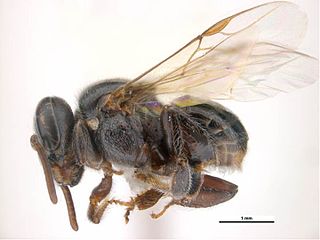A genus is a taxonomic rank used in the biological classification of living and fossil organisms, as well as viruses, in biology. In the hierarchy of biological classification, genus comes above species and below family. In binomial nomenclature, the genus name forms the first part of the binomial species name for each species within the genus.

Ansonia is a genus of true toads found in south India, northern Thailand, Malay Peninsula, Tioman Island, Borneo, and Mindanao (Philippines). These small forest species spawn in streams and have torrent-adapted tadpoles. Common name stream toads has been coined for the genus, although individual species are also being referred to as slender toads.

Halichondria is a genus of sea sponges belonging to the family Halichondriidae. These are massive, amorphous sponges with clearly separated inner and outer skeletons consisting of bundles of spicules arranged in a seemingly random pattern.

The Interim Register of Marine and Nonmarine Genera (IRMNG) is a taxonomic database which attempts to cover published genus names for all domains of life from 1753 in zoology up to the present, arranged in a single, internally consistent taxonomic hierarchy, for the benefit of Biodiversity Informatics initiatives plus general users of biodiversity (taxonomic) information. In addition to containing over 490,000 published genus name instances as at March 2020, the database holds over 1.7 million species names, although this component of the data is not maintained in as current or complete state as the genus-level holdings. IRMNG can be queried online for access to the latest version of the dataset and is also made available as periodic snapshots or data dumps for import/upload into other systems as desired.

Austroplebeia australis is a stingless bee species in the tribe Meliponini first validly described by Heinrich Friese in 1898. Within Australia, they are occasionally referred to as bush bees.
Compsosaurus is an extinct genus of phytosaur, a crocodile-like reptile that lived during the Triassic. Its fossils have been found in North Carolina. The type species, Compsosaurus priscus, was named by American paleontologist Joseph Leidy in 1856, although other sources say 1857. Compsosaurus may have been the same animal as the related Belodon.

Lamprolina is an Australian genus of leaf beetles (Chrysomelidae) found in Victoria, New South Wales, and Queensland.
Halichondria attenuata is a species of sea sponge belonging to the family Halichondriidae.
Halichondria maraensis is a species of sea sponge belonging to the family Halichondriidae.
Halichondria schmidti is a species of sea sponge belonging to the family Halichondriidae.
Halichondria papillaris is a species of sea sponge belonging to the family Halichondriidae.
Halichondria adelpha, is a species of sea sponge belonging to the family Halichondriidae.
Halichondria agglomerans is a species of sea sponge belonging to the family Halichondriidae.
Halichondria aldabrensis, is a species of sea sponge belonging to the family Halichondriidae.
Halichondria almae, is a species of sea sponge belonging to the family Halichondriidae.
Halichondria arenacea, is a species of sea sponge belonging to the family Halichondriidae.
Halichondria arenosa, is a species of sea sponge belonging to the family Halichondriidae.
Amorphinopsis armata, also known as Halichondria armata is a species of sea sponge belonging to the family Halichondriidae.
Halichondria axinelloides, is a species of sea sponge belonging to the family Halichondriidae.
Amorphinopsis is a genus of sea sponges belonging to the family Halichondriidae.




